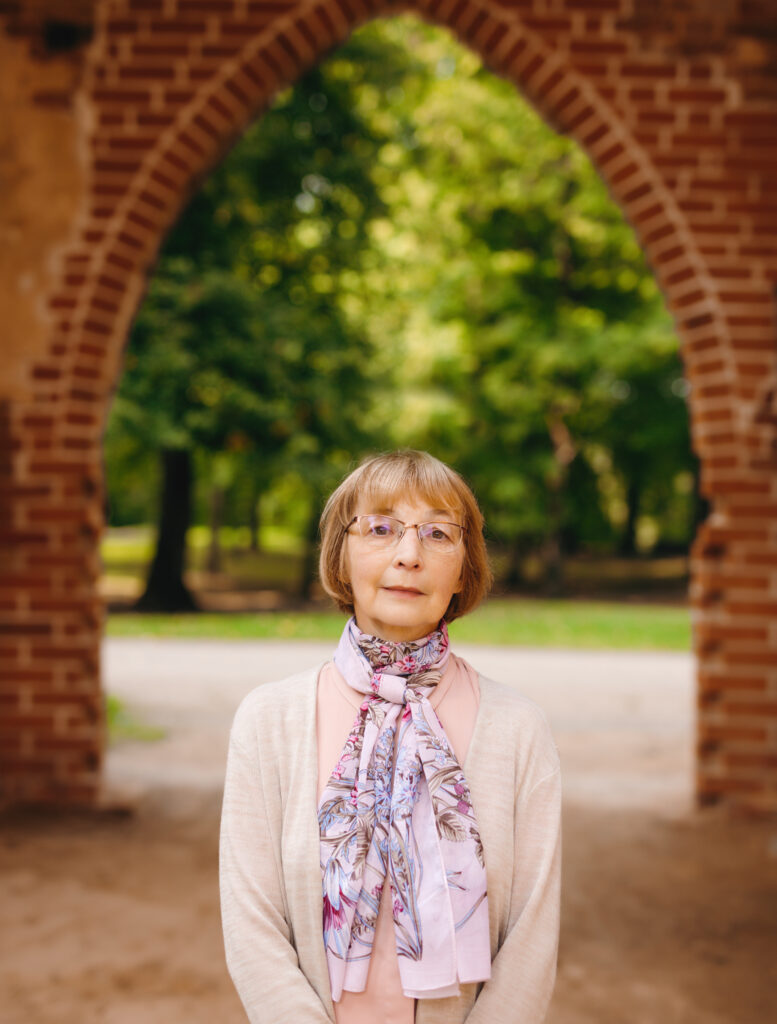
Luule Epner (1953) is a theatre and literary researcher, Ph.D. Her main areas of research are aesthetics of contemporary theatre, Estonian theatre history, relationships between dramatic texts and theatre performances. She is an associate professor of Estonian literature in the School of Humanities at the Tallinn University. For a long time she has also taught theatre studies at the University of Tartu, as well as at the Drama School of Estonian Academy of Music and Theatre. She has widely published in different journals, including Methis, Interlitteraria, Nordic Theatre Studies, Sign Systems Studies, etc. She is a co-author of Eesti kirjanduslugu (‘Estonian Literary History’, 2001) and Eesti sõnateater 1965–1985 (‘Estonian Drama Theatre 1965–1985’, 2015). Her recent book Mängitud maailmad (‘Worlds in Play’) was published in 2018. She is also an editor-in-chief of the online publication Biographical Lexikon of Estonian Theatre.
Main publications
Monograph
Mängitud maailmad. Tallinn, Tartu: Tartu Ülikooli Kirjastus, 2018, 288 lk. [‘Worlds in Play’.]
Article collections and special editions of journals (in English)
Luule Epner, Virve Sarapik, Piret Viires (toim), Cultural heterologiesand democracy: culture in the Baltic countries in the 1990s. Journal of Baltic Studies, vol 56, no 2, 2025.
Luule Epner, Anneli Saro (eds), Theatre: Stability and Dynamics. Methis, vol 2, no 3, 2009.
Articles (in English, Finnish, Hungarian, Italian, Latvian and Lithuanian)
Virve Sarapik, Luule Epner, Piret Viires, Cultural heterologies and democracy: culture in the Baltic countries in the 1990s. – Luule Epner, Virve Sarapik and Piret Viires (eds), Cultural heterologies and democracy: culture in the Baltic countries in the 1990s. Journal of Baltic Studies vol 56, no 2, 2025, pp 219-231.
Contemporary Finnish Drama in Estonian Theatre in the 21st Century. – Interlitteraria, vol 24, no 2, 2019.
Theatre NO99: An Alternative State Theatre. – Vessela S. Warner, Diana Manole (eds), Staging Postcommunism: Alternative Theatre in Eastern and Central Europe after 1989. Studies in theatre history and culture. Iowa city: University of Iowa Press, 2019, pp 32−46.
Mit csinálnak a kortárs szinházban a szinészek?. – Játéktér, no 6, 2017, pp 32−41.
Postcolonialism and Baltic Drama. – Interlitteraria, vol 22, no 1, 2017, pp 207−216.
Luule Epner, Anneli Saro, Cambiamenti sociali e paradigmi estetici del teatro estone post-sovietico. – Erica Faccioli (ed), I teatri post-sovietici: Ucraina, Bielorussia, Estonia, Lettonia, Lituania. Roma: Univers Italia, 2016, pp 91-126.
What do actors do in contemporary theatre?. – Nordic Theatre Studies, vol 26, no 1, 2014, pp 20-30.
Postdramatic textual strategies: the case of Theatre NO99. – Guna Zeltina, Sanita Reinsone (eds), Text in Contemporary Theatre: The Baltics within the World Experience. Newcastle upon Tyne: Cambridge Scholars Publishing, 2013, pp 166-174.
Theatre in the Postdramatic Text: A Phenomenological Approach. – Nordic Theatre Studies, vol 24, 2012, pp 66-75.
Writing for Theatre: New Developments in Estonian Drama of the 1990s and 2000s. – Forum for World Literature Studies, vol 4, no 3, 2012, pp 389-402.
Telling life stories as a strategy of authentication? Merle Karusoo’s “Our Biographies” and “Today We Don’t Play”. – M. Borowski, M. Sugiera (eds), Worlds in Words: Storytelling in Contemporary Theatre and Playwriting. Cambridge: Cambridge Scholars Publishing, 2010, pp 107-126.
Authenticity and fictionality in post-dramatic theatre. – Interlitteraria, vol 14, no 2, 2009, pp 290-302.
Folk tradition and modernism in turn-of-the-century drama: “The Werewolf” and “Blow, wind!”. – Anneli Mihkelev (ed), Turns in the Centuries, Turns in Literature: Comparative Approach to Estonian and Latvian Literatures in a European Context. Tallinn: Underi ja Tuglase Kirjanduskeskus, 2009, pp 80-94.
Money as the temptation and the ordeal of modern man. – Anneli Mihkelev (ed), Turns in the Centuries, Turns in Literature: Comparative Approach to Estonian and Latvian Literatures in a European Context. Tallinn: Underi ja Tuglase Kirjanduskeskus, 2009, pp 201-213.
Socialist Realism: Theory versus Reality. – E. Eglaja-Kristsone, B. Kalnacs (eds), Back to Baltic Memory: Lost and Found in Literature 1940-1968. Riga: Institute of Literature, Folklore and Art, University of Latvia, 2008, pp 113-128.
Autentiskuma noteiksanas strategija postdramatiskaja teatri. – G. Zeltina (ed), Postdramatiskais teatris: mits vai realitate. Riia: Latvijas Universitate, literaturas, folkloras un makslas instituts, 2008, pp 35-43.
Director as Playwright in Postdramatic Theatre. – Interlitteraria, vol 12, 2007, pp 210-224.
Feminine and intellectual Mari Saat. – Estonian Literary Magazine, no 25, 2007, pp 32-35.
Rupture and continuity: how history and memory are represented on the stage. – A. Mihkelev, B. Kalnacs (eds), We have something in common: the Baltic memory. Tallinn: Underi ja Tuglase Kirjanduskeskus, 2007, pp 177-196.
Elmo Niganens. – Silvija Radzobe (ed), Teātra režija Baltijā. Riga: Jumava, 2006, pp 130-141.
Redefining national identity by playing with classics. – Sign Systems Studies, vol 33, no 2, 2005, pp 380-404.
Apie modernizma estu teatre. – Menotyra, vol 37, no 4, 2004, pp 35-38.
Postmodernisms un nacionala mitologija Igaunijas teatri. – Silvija Radzobe (ed), Postmodernisms teatri un drama. Riga: Jumava, 2004, pp 113-119.
Playing with Classics in Estonian Contemporary Theatre. – Interlitteraria, vol 7, no 1, 2002, pp 117-129.
Mati Unt. – Steven Serafin (ed), Twentieth Century Eastern European Writers. Detroit: Gale Group, 2001, pp 372-378.
Virolainen draama ja teatteri 1960-70-luvulla: modernismi ja henkinen vastarinta. – T. Koistinen, P. Kruuspere, E. Sevänen, R. Turunen (eds), Kaksi tietä nykyisyyteen. Tutkimuksia kirjallisuuden ja kansallisten liikkeiden suhteista Suomessa ja Virossa. Pieksämäki: Suomalaisen Kirjallisuuden Seura, 1999, pp 341-357.
Text and stage: theatricalism in modern Estonian drama. – Interlitteraria, vol 1, 1996, pp 26-40.
Mati Untin Viro – Euroopan provinssi lännen ja idän rajalla. – Pekka Lilja (ed), Itä ja Länsi: Suomen, Viron ja Unkarin kirjallisuus idän ja lännen vaikutuskentässä. Jyväskylä: Jyväskylan yliopisto, 1994, pp 96-109.